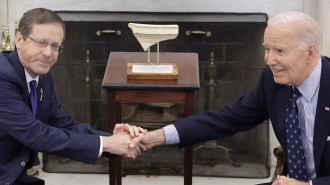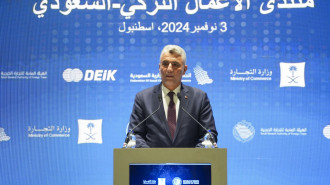Aid, peace still 'not enough' to save Yemenis from hunger: WFP
Boosting aid and even ending the devastating Yemen conflict would not be enough to end hunger in the impoverished country, a World Food Programme official said on Thursday.
"WFP hopes that the warring parties will successfully negotiate an end to this conflict, which is the only way to solve what has become the largest hunger crisis in the world," WFP spokesman Herve Verhoosel said as rival Yemeni delegations gathered for UN-brokered talks in Sweden.
"Even if we have peace tomorrow, we hope of course that we will have peace tomorrow, then you will still need to work on a way to have that economy recover," Verhoosel told AFP.
"Humanitarian support is not enough. You need the humanitarian support but you also need to save the local economy."
Yemen is home to what the UN calls the world's worst humanitarian crisis, a crisis triggered by a frail economy, massive poverty, war, blockade and disease.
The Sweden talks mark the first time in two years warring parties have sat down together in a nearly four-year war which has pushed the impoverished country to the brink of mass starvation.
The Yemen crisis spiralled after Saudi Arabia and its regional military allies launched an offensive to support Yemen's embattled government against Houthi rebels in March 2015.
The situation has worsened in recent months due to a broad economic collapse and rising violence in the rebel-held port of Hodeida, a crucial import hub for food and other basic supplies.
The UN says 24 million people in Yemen - roughly 75 percent of the population - will need humanitarian assistance in 2019.
Both the UN humanitarian agency (OCHA) and WFP have called for a boost in funds next year to help meet the needs of Yemenis - 14 million of whom stand at the brink of famine, according to UN estimates.
Last month, Save the Children said an estimated 85,000 children under age 5 may have died of hunger and disease since the outbreak of Yemen's civil war in 2015.
The international organisation said the "conservative" estimate is based on average mortality rates for Severe Acute Malnutrition, which the UN says has afflicted more than 1.3 million children since a Saudi-led coalition went to war with Yemen's Houthi rebels in March 2015.
"For every child killed by bombs and bullets, dozens are starving to death and it's entirely preventable," adding that "children who die in this way suffer immensely,” Tamer Kirolos, Save the Children's Yemen director, said.
The war and a Saudi-led blockade have created the world's worst humanitarian crisis, with more than 8 million people at risk of starvation.
According to the UN children's agency (UNICEF), more than half of the 14 million people on the edge of famine are children.
More than 22 million people - three quarters of the population - now depend on humanitarian assistance to survive.
More than 10,000 people are said to have been killed since the Saudi-led pro-government coalition intervened in the conflict in early 2015, according to the World Health Organisation, although human rights groups are adamant that the actual toll is far higher.
Follow us on Twitter: @The_NewArab







 Follow the Middle East's top stories in English at The New Arab on Google News
Follow the Middle East's top stories in English at The New Arab on Google News


